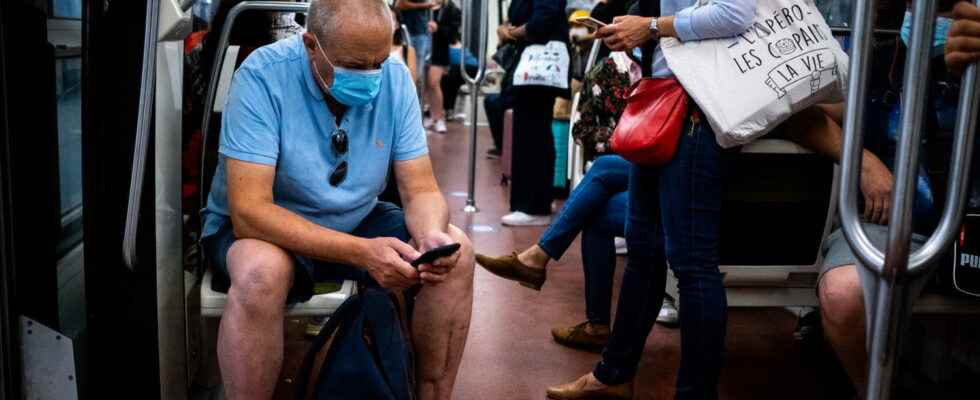COVID MASK. Since Monday May 16, the mask is no longer mandatory in public transport such as trains, buses and some planes. However, some recommendations made by health experts are still useful. The Internet user takes stock.
Masks in public transport, it’s over! Since Monday, May 16, passengers can board with their faces uncovered on buses, metro trains, trains, but also planes and airports in the European Union. The lifting of the long-awaited health restriction was announced on Wednesday May 11 by the Minister of Health, Olivier Véran. If the compulsory wearing of the mask is no longer required, it remains recommended in particular in the event of high attendance and “for all people who consider themselves threatened by the virus” as in all interior spaces. Health establishments, hospitals and nursing homes are now the only places that remain subject to the obligation to wear a mask.
These last restrictions lifted, there are few health measures left. The epidemic has been losing intensity for several weeks. “The epidemic situation is improving, the pandemic is not over, but the number of new diagnoses on a daily basis is decreasing and we consider that it is no longer appropriate to maintain this obligation to wear a mask in public transport, at from Monday May 16″, explained the Minister of Health on May 11. The lifting of the obligation has raised some concerns, but epidemiologist Pascal Crépey assured France Inter : “It is not the lifting of the mask in transport that will restart the epidemic of coronavirus“.
All the health indicators are therefore green and many French people uncover their faces, others as a precaution prefer to keep the mask on their nose. For everyone, on the other hand, respect for barrier gestures, in particular hand disinfection, is still relevant in a context where sub-variants of Omicron remain observed and monitored.
- In transport: buses, metros, trains, taxis as well as planes and airports in the European Union.
- Schools, holiday centers and leisure centres. Wearing a compulsory mask will no longer concern educational, educational and training establishments; holiday centres; leisure centers without accommodation for adult teachers and supervisors.
- In the enterprises
- Shops. Sales outlets, shopping centers and covered markets will no longer be affected by the wearing of compulsory masks.
- theaters
- theme parks
- concert halls
- festivals
- sports halls
- sports speakers
- game rooms
- libraries
- documentation centers
- cinemas
- bars
- restaurants
- fairs
- trade shows
- professional seminars if they take place outside the company and bring together more than 50 people;
- ski lifts in ski resorts
- access to tourist accommodation such as campsites or holiday clubs with a single check at the start of the stay.
If the mask can now be dropped in many places, it remains compulsory inside health establishments such as hospitals, nursing homes, care centers and it is strongly recommended in pharmacies. If everywhere else the mask is no longer compulsory, it remains “recommended” in interior spaces and transport during peak periods.
The mask is no longer a mandatory outdoor accessory since February 2 and the first wave of lifting of restrictions. It is no longer compulsory but it remains recommended and the government appeals to the logic of the French to reconnect with the wearing of a mask in very busy places.
The fine in force in the event of non-compliance with the wearing of the compulsory mask should remain at 135 euros. “Failure to comply with this measure could be liable, as is the case in other places where wearing a mask is compulsory, in particular transport, to a 4th class fine” defined by a fixed fine of 135 euros , had specified the general directorate of health as soon as this measure was put in place last year. In case of recidivism, the amount can go up to 1500 euros.
If the obligation to wear a mask now only concerns caregivers, patients and visitors to health and care facilities such as hospitals, pharmacies or medical biology laboratories, it is still recommended in certain other circumstances. As such, transport and shopping centers appear in the list of “enclosed places and large gatherings” where the mask is recommended for “frail people, because of their age or their pathologies” (as indicated government website). This recommendation should also concern aircraft, as explained by Jean-Michel Djebbari, Minister Delegate for Transport. In fact, he explained that he has been working for several weeks with “the European aviation authority” so that the mask becomes “recommended for airplanes”. According to him, the States should even include this mention in their law by next week.
These recommendations are also a call for caution. In any case, this is what part of the scientific community recommends, which recalls that the virus is still present and that it is circulating on the territory. If its viral load is lower, we are not immune to new variants that emerge, in South Africa in particular.
